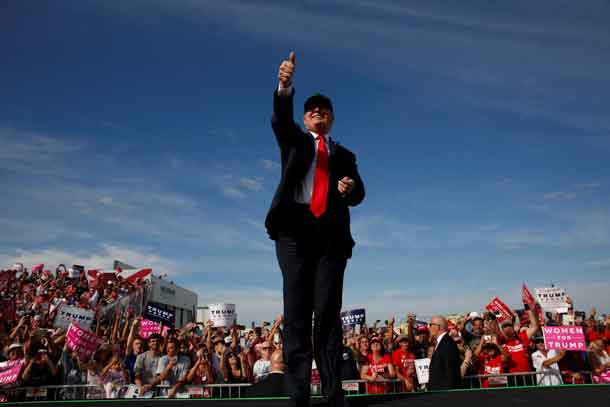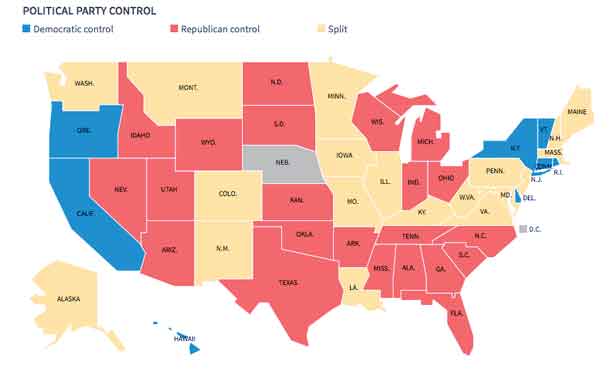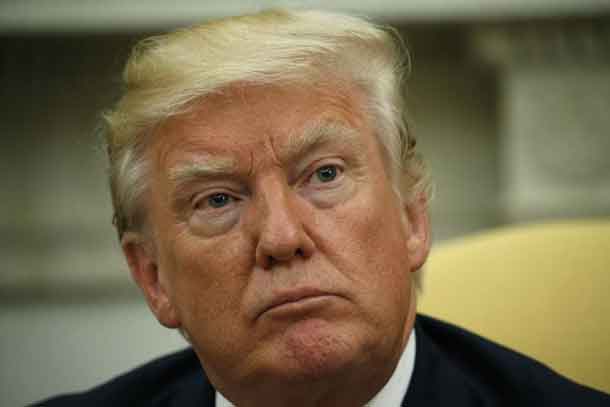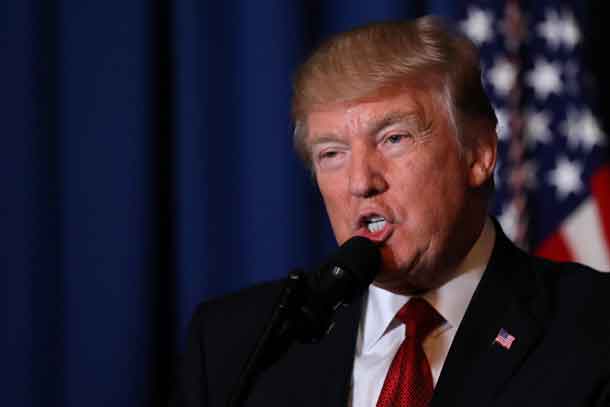
By Karen Pierog
CHICAGO (Reuters) – The Republican Party’s grip on U.S. state legislatures could loosen in next month’s election as Democrats seek to link Republican candidates to the sinking fortunes of the party’s White House candidate, Donald Trump.
Republicans, who have dominated control of legislatures since the mid-term election in 2010, currently hold the majority in 67 of the country’s 98 partisan legislative chambers, while Democrats have 31. Nebraska’s single chamber is nonpartisan.

More than 80 percent of the nation’s 7,383 state legislative seats are up for grabs on Nov. 8 and the race between Trump and Democratic presidential candidate Hillary Clinton is expected to influence races further down the ballot papers.
The bipartisan National Conference of State Legislatures (NCSL) estimates 18 legislative chambers in 12 states could switch party control, including in Arizona, Colorado, Kentucky, Minnesota, Nevada, Washington and Wisconsin.
“More than three-fourths of the time the party winning the White House also makes gains in state legislatures. So the odds are Democrats would pick up chambers and seats on the whole if (Clinton) wins,” said Tim Storey, a NCSL elections analyst.
National opinion polls show Clinton leading Trump with just under two weeks to go until Election Day.
Democrats are also getting a big boost for down ballot races with Clinton surrogates such as President Barack Obama, Vice President Joe Biden, and first lady Michelle Obama on the campaign trail stumping for party candidates.
Trump, on the other hand, is openly feuding with Republican leaders, many of whom distanced themselves from the candidate after a 2005 video surfaced earlier this month in which he is heard bragging about groping women and making other unwanted sexual advances.
Storey said while Trump has his pockets of popularity, the top Republican on the party’s ticket has become a main line of attack by Democrats in swing districts.
“Instead of taxes or health care or public safety or education, Trump has been an issue in many places,” he said.
According to Jessica Post, executive director of the Democratic Legislative Campaign Committee (DLCC), which is working to elect Democratic state lawmakers, “Trump is quicksand for legislative Republicans.”
But Matt Walter, president of the Republican State Leadership Committee (RSLC), which hopes to spend $40 million on legislative and other state races this election cycle, said the Democrats’ strategy of using Trump to campaign against Republicans is not working. He contended his party’s candidates can win even without presidential coattails.
“A good candidate who understands her district, who presents viable solutions for that district in that state has a better than even odds of winning in any type of environment,” he said.
REPUBLICANS TRY OFFENCE
In addition to defending legislative turf, Republicans are trying to play offence, targeting 13 chambers in 10 states for seat gains, including Illinois, Iowa, Kentucky, Vermont, Colorado and Oregon.
Post said Democratic candidates are offering voters “a crucial firewall against Republican overreach” in states dominated by Republicans, like North Carolina, where there has been a backlash against a law on use of public bathrooms that critics say discriminates against transgender people.
With all of Minnesota’s legislative seats up for election, Democrats need a net gain of seven seats to take control of the House and turn the state, which has a Democratic governor, in their favour.
Larry Jacobs, a University of Minnesota political science professor, said a Democratic sweep could open the way for legislation funding capital projects and transportation as well as early childhood education.
In Illinois, Republican Governor Bruce Rauner, his wife and two of his wealthiest donors have contributed a combined $18 million since the March primary to House Republican leader Jim Durkin and to a super-PAC devoted to chipping away at Democrats’ veto-proof majorities in the state’s House and Senate.
Democrats have been in a political stalemate with Rauner for nearly two years over the budget and other issues.
In West Virginia, historically a Democratic stronghold state, Republicans took control of the state’s House, Senate, and governor’s office in 2014 for the first time in 83 years. This election, Democrats want the Senate back.
Tom Susman, president of TSG Consulting, a Charleston, West Virginia-based government affairs public relations firm, said the likely scenario is the Senate remains Republican, with much of the power ceded to a growing fiscally conservative faction.
“Moderate Republicans are in trouble,” said Susman. “We could be looking at a Kansas-like situation. Then, it would basically be the Tea Party running the state Senate. No new taxes. All cuts.”
(Reporting By Karen Pierog; Additional reporting by Dave McKinney, Robin Respaut and Hilary Russ; Editing by Daniel Bases and Frances Kerry)




